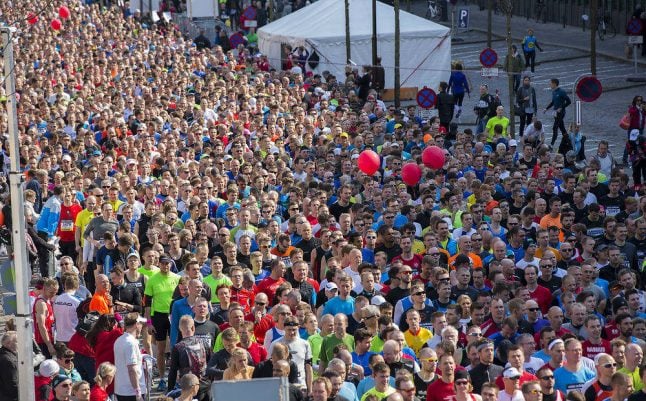The organizers of the Aarhus City Half Marathon recently announced they had changed plans to release thousands of balloons prior to this Sunday’s running event.
The decision marks a public recognition by organizers that high-participation sports events like marathons and half marathons can have a negative environmental impact, and that a change in approach is necessary to offset this.
In a country in which the environment was a major priority for voters in the recent general election, it has been necessary for endurance running events, at which thousands of plastic cups are used, to consider their approach.
“We want to lead the way when it comes to more environmentally friendly running events,” Birgit Schultz, head of communication for Aarhus Motion, which organizes the city’s half marathon as well its DHL Relay team running event, told The Local via email.
Chloe Malinka, a marine scientist at Aarhus University, welcomed the decision to drop balloons from the Aarhus City Half Marathon.
“Plastic balloons cannot fully break down in the environment, and these microplastics end up lodged in the stomachs of animals, contaminating our waterways, and infiltrating our food chain,” Malinka told The Local.
Malinka pointed out that two Danish municipalities, Fanø and Varde, have banned the release of balloons from municipal institutions, as Danish media Ingeniøren reported last year. A sizeable number of local authorities in the United Kingdom have taken a similar step, as have four US states, according to that report.
Copenhagen Marathon did release balloons at its 2019 edition, but as a one-off occurrence, said Dorte Vibjerg, director of race organizer Sparta.
“It was one time only, and only because of our 40th anniversary,” Vibjerg told The Local via email. The balloons released at the marathon were biodegradable, she added.
But Malinka said balloons categorized as biodegradable also presented a hazard for wildlife.
“The degradation of these biodegradable balloons only occurs under specific composting circumstances. This degradation is also a slow process, whereby the balloons have the opportunity to be mistaken for food by seabirds, seals, and whales and the balloons end up clogging the stomachs of animals, all before they have the time to degrade,” she said.
In a press statement earlier this month, Aarhus Motion confirmed it would not release balloons while also acknowledging it faces other challenges in order to reduce its overall environmental footprint.
“We can’t change everything at once, so we have decided to look at certain areas in which we can reduce plastic use. That will include removing (plastic) water bags from water stations and instead donating the 25,000 kroner we normally pay for the bags to Danish environment organization Plastic Change,” event manager Jeanette Bøye Sørensen said in the statement.
Finishers’ t-shirts for this year’s half marathon will also be supplied without plastic wrapping.
The Aarhus event, which expects 11,500 to 12,000 runners to participate on Sunday, uses card for half of its drinks cups and a chalk-plastic compound for the other half, Schultz said.
“All the cardboard from the packaging and all the plastic bottles will be recycled,” she said.
Approximately 180,000 plastic cups were used during the 2019 Telenor Copenhagen Marathon, organizer Sparta confirmed to The Local.
The event is working on a way of improving the material used for cups at the event’s drinks stations, Vibjerg said.
“We already cooperate with the InnovationLab of Sports and Copenhagen Municipality about different solutions, (including) new cups made of biodegradable material. But the cups have to work, and we haven't found the right product yet,” she said.
Sparta will test new products at the DHL Relay events it organizes later this year with a view to rolling them out to its other events, the Sparta director said.
“We are looking for more green solutions on everything from medals to t-shirts — maybe they don't have to be mandatory,” she added.
READ MORE: In pictures: Temperatures soar as 13,000 run 2019 Copenhagen Marathon



 Please whitelist us to continue reading.
Please whitelist us to continue reading.
Member comments